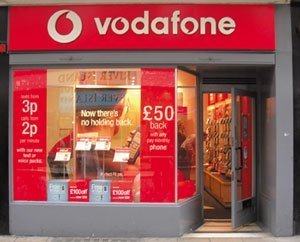
Vodafone is the world’s largest mobile telecommunications community, employing over 65,000 staff and with over 130 million customers. The business operates in 26 countries worldwide. Vodafone is a public limited company with listings on the London and New York stock exchanges.
Global recognition of the Vodafone brand is growing as the company rolls out its identity into new markets. However, it retains local names and imagery in markets where this is essential to maintaining the trust of customers.
To help promote its image worldwide, Vodafone uses leading sports stars from high profile global sports, including David Beckham and Michael Schumacher. This Case Study concentrates on how such promotion can help to keep a leading brand at the forefront of public awareness.
The essentials of marketing
The world is a global market with few barriers, so Vodafone has to be highly visible as ‘the brand to buy’. Effective marketing is the key to this high visibility.
Marketing involves anticipating customers’ needs and finding the right product or service to meet those needs, thereby encouraging high sales levels. Vodafone goes further by looking to impress on its customers not merely what its products are i.e. features, but also what they can increasingly do i.e, benefits. This involves effective communication.
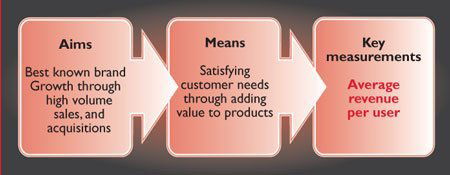
There is a slowdown in sales of mobile handsets, in some markets like the UK, as the mature part of the product lifecycle is reached. Customers are exposed to a barrage of different images and messages by mobile phone companies, as the competition gets tougher. Vodafone appeals to new customers and aims to keep its existing ones by emphasising the uniqueness of the brand. Vodafone’s aim is to grow its revenue and improve its profit margin by adding value to its products and services i.e. earning more from each product sold. The ‘Vodafone live!’ service enables customers to use picture messaging and to download polyphonic ring tones, colour games, images and information, through an icon-driven menu.
This service will soon be further enhanced by picture messaging libraries, video clips and video telephony (seeing the person you’re calling) and improving download speeds. Another service is the Vodafone Mobile Connect Card, which enables customers to access their normal business applications on a laptop when out of the office. Such services add value to the product, and high profile effective promotion will help sell these services to existing and new customers.
The marketing mix
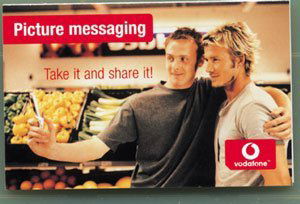
A longer term marketing strategy is underpinned by careful planning and a successful marketing mix. The marketing mix is a combination of many features that can be represented by the four Ps:
- product – features and benefits of a good or service
- place – where the good or service can be bought
- price – the cost of a good or service
- promotion – how customers are made aware of a good or service.
Product
- A product with many different features provides customers with opportunities to chat, play games, send and receive pictures, change ring tones, receive information about travel and sporting events, obtain billing information – and soon view video clips and send video messages.
- Vodafone live! provides on-the-move information services.
Place
- Vodafone UK operates over 300 of its own stores.
- It also sells through independent retailers e.g. Carphone Warehouse.
- Customers are able to see and handle products they are considering buying.
- People are on hand to ensure customers’ needs are matched with the right product and to explain the different options available.
Price
- Vodafone wants to make its services accessible to as many people as possible: from the young, through apprentices and high powered business executives, to the more mature users.
- It offers various pricing structures to suit different customer groups.
- Monthly price plans are available as well as prepay options. Phone users can top up their phone on line.
- Vodafone UK gives NECTAR reward points for every £1 spent on calls, text messages, picture messages and ring tones.
Promotion
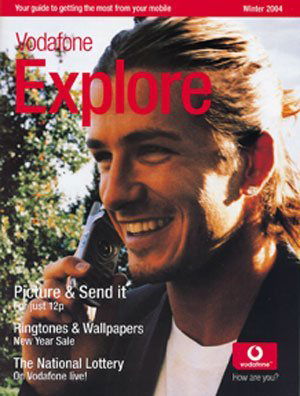
Vodafone works with icons such as David Beckham to communicate its brand values.
Above the line
- Advertising on TV, on billboards, in magazines and in other media outlets reaches large audiences and spreads the brand image and the message very effectively. This is known as above the line promotion.
Below the line
- Stores have special offers, promotions and point of sale posters to attract those inside the stores to buy.
- Vodafone’s stores, its products and its staff all project the brand image.
- Vodafone actively develops good public relations by sending press releases to national newspapers and magazines to explain new products and ideas.
Getting the message across
Vodafone UK produces various publications for customers and staff, e.g:
- Vodafone Essentials: outlines the product range
- Vodafone Explore: helps customers to maximise their use of their purchase
- Direct mail: stimulates customers and potential customers to find out more
- Vodafone life! A magazine for employees, detailing products, people and sponsorship deals
Vodafone and David Beckham
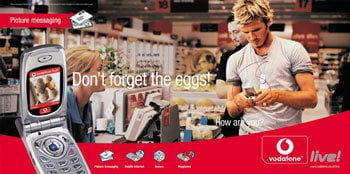
David Beckham is more than a footballer. He is also regarded as a fashion icon, a caring family man and a nice guy: an overall image that attracted Vodafone to him. Beckham’s popularity with football fans comes largely from his England team captaincy. As a footballer, he is well regarded around the world. Other young men who might aspire to his success and style also tend to identify with him. He appeals to many females because of his reputation as a fashion and lifestyle icon. He is also married to a female icon in her own right.
Vodafone’s sponsorship of the Manchester United team appeals to a broad section of the global football/sports audience, whereas aspects of Beckham’s broader image have grown to appeal to a much wider section of society. That suits Vodafone, who needs to appeal to different segments of the market.
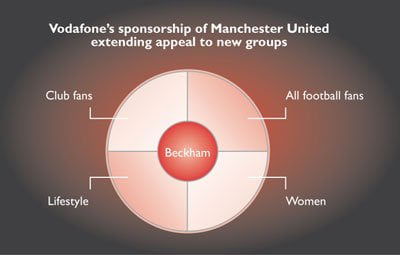
Beckham’s healthy lifestyle allied to his talent suggests an energy and a controlled passion for life; an image that Vodafone would also like to project for itself. On a football field, Beckham is innovative, creative, exciting; characteristics that Vodafone aspires to. Beckham the family man comes across as caring and empathetic; Vodafone wants people to appreciate that it too understands and cares about what people want and need. Beckham is generally seen as dependable; Vodafone wants to communicate a similar image. The synergy is clear.
The campaign
Beckham is supporting the campaign to promote Vodafone live! in the UK and in other markets. The UK campaign shows Beckham doing everyday things: a happy, relaxed, competent shopper sending pictures and accepting a message to remember to buy eggs. At the same time he is also clearly demonstrating what Vodafone live! can do.
The TV campaign has been a huge success. Many people have seen it and can recall the adverts. The campaign captured the imagination of the press, and many newspapers covered stories about Beckham’s sponsorship deal. Slogans such as ‘Send it like Beckham’ help to further promote the Vodafone message. Beckham’s image is also used on a variety of other customer communications including in-store posters, billboards, in the company’s magazines and catalogues and in leaflets mailed to customers.
Market research
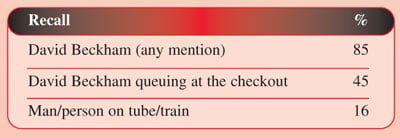
High profile campaigns are a gamble. The campaign’s impact has to justify the time, money and effort spent on it. The marketing team must evaluate the campaign’s success. Vodafone UK has asked people across different sectors of society about the campaign, and has analysed their responses. Individuals were asked what they could remember about the campaigns. This is known in the marketing industry as recall.
Another exercise assessed the effectiveness of the poster depicting Beckham being reminded to buy some eggs. People in the survey are shown different Vodafone posters and asked to say which of them they recall in relation to Vodafone live! Clearly, the Beckham poster is far and away the one that is best recalled.
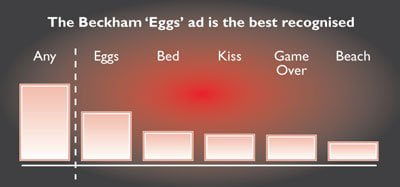
Other data has been used to assess the success of the Beckham promotion. Findings from UK Brand Tracking data reveal that the TV campaign has increased awareness of Vodafone with above average efficiency as measured by the Awareness Index, primarily because of the Beckham scenes. People are able to recall and describe the advertisements without prompting.
Brand migration
The Beckham campaign has also helped to support Vodafone’s drive for brand migration. Vodafone can help to fulfil its aim to grow successfully by acquiring local companies in markets that Vodafone would like to enter. A good example of this is Vodafone’s purchase of J-Phone in Japan. The initial strategy was to use a dual J-Phone Vodafone logo alongside the powerful image of Beckham to emphasise the relationship between the two companies.
The final transition removed the J-Phone logo altogether to a sole focus on Vodafone (Vodafone KK). This strategy warmed J-Phone’s customers to the idea of a global brand replacing a local brand. David Beckham is a popular figure in Japan and helped to smooth the way for the substitution of the global brand in place of the local one.
Conclusion
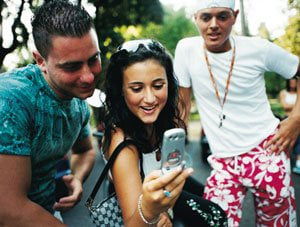
In a highly competitive market, David Beckham is the latest in a number of high profile celebrities and sports personalities that Vodafone has used to promote Vodafone live! Market research and increased sales indicate that using Beckham’s image has been highly effective. Sponsorship using stars involves a partnership between the star and the company, and success depends on both remaining high profile and in the public eye.
The Beckham campaign is seen in many countries worldwide and reinforces his own image as well as communicating Vodafone’s brand values. Beckham is something of a phenomenon whose star status shows no sign of waning. Vodafone believes that it has gained an important advantage in a highly competitive market place as a result of having such a high profile, admired star attached to its name and its product.
